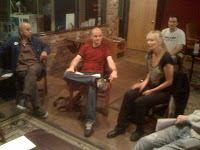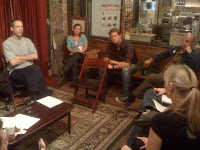| Numinous The Music of Joseph C. Phillips Jr. |
The Numinosum Blog
|
It's time again for another Composer Salon. The last one in September on the topic, The Audience, was a good time with a lively and fun discussion. The next Salon is:
Tuesday October 20, 2009 from 7 pm to around 9 pm at the Brooklyn Lyceum (227 4th Avenue in Park Slope, Brooklyn). The Lyceum is literally above the Union Street M, R Train stop in Brooklyn. The Lyceum does have various inexpensive libations including different beers, wine and other non-alcoholic beverages, as well as coffee and baked goods. Salon Topic #2: With some topics I read on various blogs recently (which you can find the links to below) I thought the subject of where classical music and jazz are headed to leads to this month's Salon topic: Future Past Present. This quote from Hannah Arendt, which I think I first read in the liner notes to the Dave Douglas CD Five, seems to fit with my thinking about where both classical and jazz at the moment (or at least where it should be going): There is an element in the critical interpretation of the past, an interpretation whose chief aim is to discover the real origins of traditional concepts in order to distill from them anew their original spirit which has so sadly evaporated. I. Pat Metheny in his keynote address to the (now defunct) International Association of Jazz Educators (IAJE) convention in 2001 challenged musicians “to recreate and reinvent the music to a new paradigm resonant to this era, a new time.” Not to recreate the past, but to push and remake music of and for our own generation and time. Like the first line in the Stephen George poem "Entrückung" that Arnold Schoenberg set in his groundbreaking Second String Quartet, I also feel the “Luft von anderem Planeten" ("the air from another planet"). There does seem to be something in the zeitgeist where “artistic” composers and musicians are thinking beyond genre and really seeing the popular music of their times as valuable sources of inspiration (let alone for plain guilt-free enjoyment). I'm actually very excited with what is happening with this development in art music (something that I, along with many in my and younger generations have felt along) but frustrated in the continued old ways and thinking that seem to dominate much of the cultural artistic space. I am hopeful though because like Sam Cooke sang, "a change is gonna come..." How do you address Metheny’s sentiment in your own work? Or do you feel it is even important to do this? II. In an interview years ago composer John Adams was asked the question: What's your opinion of the future of the orchestra? I think his response was quite telling coming from one of America’s leading composers of orchestral music: “When people ask that question I have to be quite blunt: I think the orchestral tradition has pretty much come and gone. There are periods in which a certain artistic genre sees a birth, a flourishing and then an eventual decline. It doesn't matter whether it's Elizabethan drama or Italian madrigal or the Homeric epic. Every genre eventually passes from the scene. Orchestral music reached its peak around 1900, and there's been a period of natural decline ever since. Look at how few substantial additions there have been to the repertoire since 1950 - it speaks for itself.” From my viewpoint it seems that orchestras and orchestral music is quite entrenched, well at least as far as cultural dollars go. In the comments of a posting on Greg Sandow’s blog about classical music’s presentation problem, I said, “Certainly the large classical institutions draw a lot of financial oxygen from any market. $10,000 or $20,000 might not make much difference to the NY Phil, but make it an easily available grant to a hungry new music outfit, I think you would immediately see more diverse, daring, interesting (not always successful, but that's ok) programming that would attract a more diverse (racially, aged, and economically) group of people, especially if they aren't charging $50-75+ for seats, and would feel more real and relevant to the listeners.” In our society with its unacknowledged plutocratic tendencies, seems like that entrenchment isn’t going to change anytime soon. In the jazz world, Jazz at Lincoln Center operates much like the jazz equilvant of an orchestra organization. Larry Blumenfeld wrote about J@LC in the Wall Street Journal a few weeks ago and also in a blog in a post about Jazz at Lincoln Center. I commented on his blog, I think that J@LC does deserve credit for raising the bar for jazz in the upper crust circles that previously would never consider jazz worthy of support. However, with such a mark of status, J@LC could be so much more. I think there is frustration that the conservative attitude at J@LC by freezing jazz in amber freezes out many great musicians who don't fit the model. And without any real choice or competition, there doesn't seem to be any (or very little) institutional avenue for more contemporary and progressive takes of what jazz is. The only major jazz institution with any clout really is J@LC and that's frustrating. In the classical world, sure you can have some fundamentally conservative and cautious organizations like the NY Phil and the Met (both which are disappointing in similar ways as J@LC, although under Gelb at least the Met is moving in a different direction), but that is more than offset by other adventurous organizations such as the SF Symphony or even Bang on a Can. Where is the Bang on a Can-like organization for jazz? If there were some competition for the 'jazz dollar', some other high profile organization to take on music/groups/composers that which J@LC won't or can't, some one other than Wynton to be able to bend the ear (and get the eye) of Obama and Clinton, I bet there would be less animosity toward Wynton and J@LC because he wouldn't be the only gatekeeper, his voice would be balanced by a competing voice. Just as you could never have a working class person run for state-wide offices in today’s society because the amounts of money needed for a campaign, how can the non- institutional groups, ensembles, performers of classical and jazz many of which often are pointing to new and exciting directions for the music (and where my hope for the future of the music lies), ever hope for the recognition and dollars (which in itself can represent status), if they don’t have the resources to compete? Sadly in many ways, this seems to me a class struggle between the haves (large orchestra and opera companies or J@LC in the jazz world) and the have-nots or has a little (smaller organizations and ensembles) fighting for survival in genres that generally speaking, very few are listening to or are much interested in. So since classical and jazz are just niche markets that are shrinking in the music marketplace, have we hit that decline that John Adams talks? As Greg Sandow says in the above blog post, is it the music or the presentation? If we change either, will people listen and the music become more relevant? More listened to? Where is the music going and what is it evolving into? Do all of the social networking media, blogs, and direct marketing over the Internet affect what classical and jazz are? Will become? If you are a composer or musician or music lover in the New York City area, I hope you'll consider coming down to the Lyceum and join the discussion, or at the very least add your thoughts in the comments. Hope to see some of you on the 20th. POSTED BY NUMINOUS AT 9:42 PM
0 Comments
Your comment will be posted after it is approved.
Leave a Reply. |
The NuminosumTo all things that create a sense of wonder and beauty that inspires and enlightens. Categories
All
|
Thanks and credit to all the original photos on this website to: David Andrako, Concrete Temple Theatre, Marcy Begian, Mark Elzey, Ed Lefkowicz, Donald Martinez, Kimberly McCollum, Geoff Ogle, Joseph C. Phillips Jr., Daniel Wolf-courtesy of Roulette, Andrew Robertson, Viscena Photography, Jennifer Kang, Carolyn Wolf, Mark Elzey, Karen Wise, Numinosito. The Numinous Changing Same album design artwork by DM Stith. The Numinous The Grey Land album design and artwork by Brock Lefferts. Contact for photo credit and information on specific images.


 RSS Feed
RSS Feed